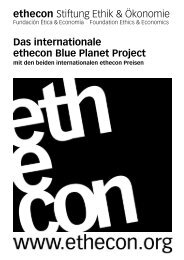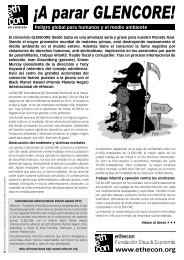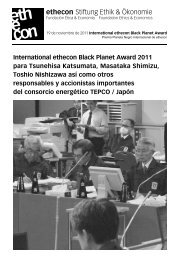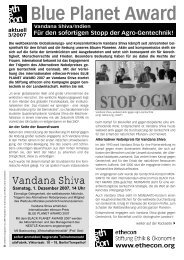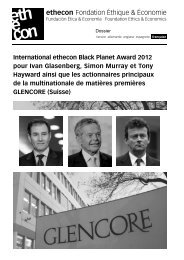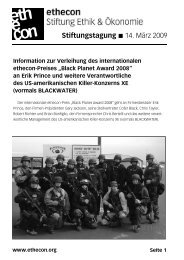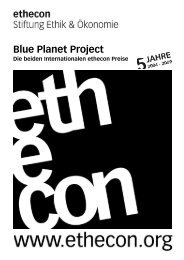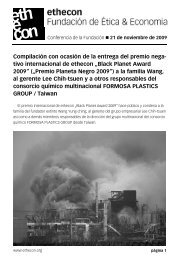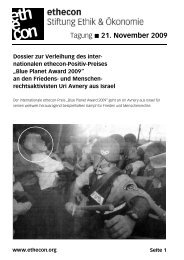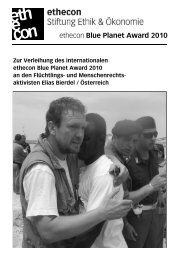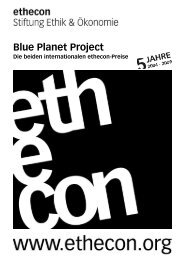Dossier Angela Davis / Blue Planet 2011 - Ethecon
Dossier Angela Davis / Blue Planet 2011 - Ethecon
Dossier Angela Davis / Blue Planet 2011 - Ethecon
You also want an ePaper? Increase the reach of your titles
YUMPU automatically turns print PDFs into web optimized ePapers that Google loves.
ethecon Foundation Ethics & Economics<br />
Fundación Ética & Economía Stiftung Ethik & Ökonomie<br />
International ethecon <strong>Blue</strong> <strong>Planet</strong> Award <strong>2011</strong><br />
for the civil and human rights activist<br />
<strong>Angela</strong> <strong>Davis</strong> / USA<br />
Greetings from Prof. Dr. Dr. hc. Oskar Negt 43<br />
Dear <strong>Angela</strong>,<br />
I was most happy to hear that the ethecon Foundation will be presenting you an award in honour of<br />
your tireless endeavours in the cause of civil liberties at all levels. No one deserves this prize more than<br />
you. Fortunately I've come across my letter of recommendation supporting the proposal to grant you an<br />
honorary doctorate from the University of Frankfurt/Main; I'd like to forward it to you; it sums up why I<br />
hold you in such high esteem.<br />
----<br />
Best Wishes, Oskar Negt<br />
Review of the Kant paper by <strong>Angela</strong> <strong>Davis</strong><br />
for the honorary doctorate screening process<br />
at the Johann-Wolfgang-Goethe-University in Frankfurt/Main,1972<br />
My knowledge of <strong>Angela</strong> <strong>Davis</strong>' work and intellectual ability is of course incomplete. However, during<br />
the two semesters in which she studied philosophy with Adorno, Habermas and me, she made an outstanding<br />
impression on me which was confirmed by later publications. <strong>Angela</strong> <strong>Davis</strong> belongs – and this I<br />
can say without exaggeration – to the very small group of students who are extremely gifted and show<br />
a pronounced sensitivity for philosophical problems. This became clear to me after just a few months of<br />
intensive discussions; despite her language difficulties she was able not only to discuss, but also to objectify<br />
in written form, the most complex problems of Kant's transcendental philosophy and Hegel's<br />
dialectics.<br />
A paper on the notion of interest in transcendental philosophy written for a seminar on Kant's “Critique<br />
of the Power of Judgment” documents this unusual capability. With great keenness and clarity she<br />
identifies and elaborates on those problematic elements of Kant's philosophy which, as widely known,<br />
are not only confined to the Schematism Chapter in the “Critique of Pure Reason.” She criticizes the<br />
idea that it is only the patently obscure and difficult to understand passages in Kant's work in which the<br />
dialectic problem of the interdependence of form and content is concealed by aporetic constructions.<br />
She convincingly shows that notions such as interest, dignity, intelligible subject, etc. are determined by<br />
the same structure.<br />
43 Prof. Oskar Negt (born 1934) is a social philosopher. From 1962 until 1970 he was the assistant of Jürgen Habermas at the universities of<br />
Heidelberg and Frankfurt on the Main, where he also taught. Afterwards, he was a professor at the Gottfried Wilhelm Leibniz University of<br />
Hanover until his retirement. He was a visiting professor in Berne/Switzerland, Vienna/Austria, Milwaukee/USA and Madison/USA. Negt is<br />
considered to be one of the masterminds of the Critical Theory. Besides his scientific work, he used to address current political topics regularly.<br />
www.ethecon.org / Facebook / Twitter<br />
Page 25





